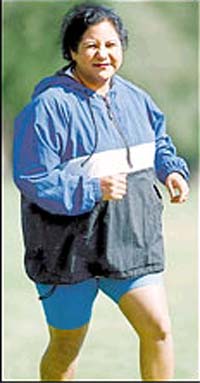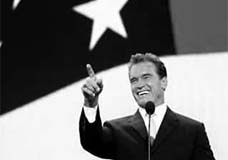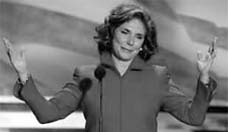
RPCV Marta Metelko runs first marathon
Conquering 26.2 Miles: It's All Relative
Weldon Johnson and Marta Rivera Metelko each ran – and finished – their first marathon last year at Marine Corps. albeit at different paces. (By John McDonnell - The Post)
By Jim Hage
Special to The Washington Post
Friday, October 22, 1999; Page H2
Marine Corps Marathon runner Weldon Johnson is tall and lean. Fellow marathoner Marta Rivera Metelko is, well, not.
"This is hardly the body of a marathon runner," Metelko laughed.
But it is.
Both runners finished last year's marathon. Johnson, 26, won in 2 hours 25 minutes 31 seconds. Metelko, 37, was the last runner to finish in less than six hours, 5:59:55.
Johnson and Metelko live within a couple of miles of each other in Northwest Washington. Both have thriving professional careers and work downtown in the K Street corridor. It's possible they have bumped into each other on some bustling street corner at midday.
Perhaps, too, they crossed paths while running on Connecticut Avenue or along the trails in Rock Creek Park. For each of them, last year's marathon was a first. Johnson averaged 5:30 per mile. Metelko ran steadily at about 13:45 per mile.
Despite their geographic and professional commonalities, Johnson and Metelko would seem to be from different planets with regard to marathon running.
But as Dale Berra once said about his father, Yogi: "Our similarities are different."
Johnson and Metelko each trained hundreds of miles before their first marathon. Johnson logged his hundreds every week. Metelko averaged just over a hundred each month.
Metelko based her training on the slow-but-sure Jeff Galloway training program through which hundreds of thousands of walkers and joggers have completed the marathon's 26.2 miles.
Johnson, an economics research consultant, receives training advice from his high school coach in Dallas. Johnson usually trains twice each day, often late after work, with his twin brother, Robert. The pair runs track intervals twice a week. Earlier this month, Weldon ran on the U.S. half-marathon team that competed in Palermo, Italy. On Sunday, Robert will be running Marine Corps while Weldon will be in Chicago, trying to qualify for next year's Olympic trials.
"Running is what I do," Weldon Johnson said. "It's what's important to me. When I told the people at work that I was going to run the marathon, they asked if I was raising money for a charity. I told them, no, I wanted to win the thing. I'm not sure they understood."
Metelko is the chief executive officer for MANA, a national Latina organization. She moved here from California four years ago. Long office hours have cut into her plans for improving in this year's race.
"I haven't trained like I'd hoped," she said. "But I still want to beat last year's time. I've already told lots of people I'm going to run, so I can't back off."
Metelko does not train with a club or run for a charity, an increasingly popular method that provides training tips and camaraderie. "My husband and I run together. This is something we do for ourselves," she said.
Race Day
Two goals, two definitions of success.
Johnson had his toes on the starting line when the 105mm howitzer fired to send more than 13,000 runners on their journey last year. Even though it was his first marathon, Johnson was confident he had a chance to win. He had prepared diligently and had run 20 miles of the Chicago Marathon in training two weeks earlier.
"The big thing early on was to pace myself," Johnson said. "The first few miles felt really easy, and when the course doubled back, the other runners were really encouraging."
Somewhere in that throng was Metelko, who started in the rear of the pack and crossed the starting line just before Johnson reached the one-mile mark. She wasn't worried about the delay, however: "We were bunched pretty tightly at the start," Metelko said. "But it was really exciting. I couldn't believe it was finally happening."
Metelko's husband was the stronger runner of the couple and struck out ahead. She was alone to mark the miles, and her doubts. "I was never worried that I wasn't going to finish," she said. "But I was still worried about getting to the bridge in time."
The bridge is the 14th Street Bridge, which is reopened to traffic five hours into the race. Runners who have not crossed by 1:30 p.m. are disqualified from finishing and shepherded into a bus for an ignominious ride to the finish line. To Metelko, the bridge was the difference between victory and defeat.
"I was fixated on that bridge," Metelko said. "I never walked. I just had to get there and then finish."
Johnson ran with his brother until seven miles, when, as planned, his twin dropped out. Through the marathon's middle miles, Johnson built a big lead. Running alone, however, he succumbed to the enervating loneliness of the long-distance runner.
"My concern early on was in going out too fast," he said. "I didn't want to hit the wall and blow up."
Finally, perhaps inevitably, Johnson's calf began to ache, and his pace slackened. "Is this normal?" he asked himself. "I started to envision all these terrible scenarios about leading the whole way, and not finishing."
Johnson maintained his lead, however, and climbed the final hill leading to the Iwo Jima memorial ahead, literally, by a mile. "The winner is usually the guy who feels better at the end," Johnson said. "I'm not so sure that was the case with me."
At the same time Johnson broke the finishing tape, Metelko neared the 11-mile mark on the Mall. Her steady effort got her to the bridge in just under five hours. "The rest is going to be easy," she told herself.
And it was, relatively. "I could have gone another four miles," Metelko said.
As Johnson slowly made his way home, he stood and watched the hundreds of runners still streaming toward the finish. "It's an impressive sight," he said. "I think it's a lot harder to run a marathon in six hours than it is in two and a half."
What Were They Thinking?
Ever wonder what is going through the minds of marathoners? Special correspondent Jim Hage asked two first-timers from the 1998 Marine Corps Marathon to take him through the course one more time.
Marta Rivera Metelko
Marta Rivera Metelko
Age: 37
Hometown: Washington
Finish time: 5:59:55
Marathon goal this year: Beating her time from last year's race
(By John McDonnell - The Post)
At the start?
"I couldn't believe it was finally happening."
The first few miles
"As soon as we started, I started freaking that I wouldn't get to the [14th Street] bridge before it closed."
Miles 7 through 10
"I was never worried that I wasn't going to finish. It felt pretty easy – just like a training run – and I told myself I was going to make it. But I was still worried about getting to the bridge in time."
Halfway
"I wondered where my husband [also running] was at. I told myself I was going to finish, no matter what."
At Mile 18
"I was closing in on the bridge, but still I wasn't confident. Except about finishing. I thought, 'Eight miles left – anybody can do that.' So I plugged on."
At Mile 20
"Things were spread out there, and I was getting tired and hungry. Out of nowhere, this spectator appeared and gave me one of those gel packs [energy food]. What a lifesaver!"
The dreaded 14th Street Bridge
"Everyone was so encouraging, I started to feel really good. I was so happy to get over that bridge. The rest was going to be easy."
The hill to the finish
"The Marines were great going up the hill. I was starting to hurt just a little bit for the first time there."
After the race
"I was so happy, and felt so good. I could have gone another four miles."
© Copyright 1999 The Washington Post Company




